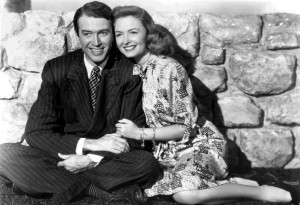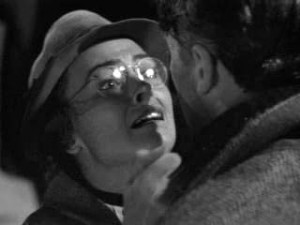I watched It’s a Wonderful Life (Frank Capra, 1946) this afternoon. It’s a yearly ritual. My companion and I, who avowedly “don’t do Christmas”, make these little concessions: It’s a Wonderful Life on Christmas Eve. A Christmas Carol on Christmas Day. And though we harrumph our way through them, like the consummate curmudgeons we are, bemoaning how cringingly annoying Tiny Tim unfailingly is, a tear nevertheless pricks at our eyes at those points in the narrative that are designed precisely to manipulate all but the most hardened viewer, touching on our collective weak spot for beautiful lies about hope, kindness, and personal redemption.

George and Mary: happily married.
Towards the end of It’s a Wonderful Life, Clarence (Henry Travers), the “angel class 2” questing for his wings, shows a suicidal George, played by a young Jimmy Stewart, all the horrors that would have befallen his small home town of Bedford Falls had he never been born. Bedford Falls is now renamed “Potterville”, after the corrupt Plutocrat who, in this parallel world, absent George’s friendly family business, has a monopoly on the townspeople’s accommodation and debt. George’s little brother, who went on be a decorated war hero in Bedford Falls, instead died at the age of 9 in Potterville, because George was not there to save him when he slipped into an icy lake. The old druggist, Gower, for whom George worked as a boy, is an outcast who has served time in jail because there was no young George to stop him accidentally dispensing poison to a customer in a grief-stricken state on the day of his son’s death. But finally, when Clarence has revealed bombshell after bombshell, and he has told our hero “you see, George, you had a wonderful life”, and our eyes are as wet and stinging as they can get, he drops the ultimate piece of bad news about the alternative, George-free world of Potterville. “What happened to Mary?” George asks, of his wife (Donna Reed). Clarence is loth to tell him. Clarence demurs. “I’m not supposed to tell you…,” he protests. Finally, however, he speaks the fated words: “She became an old maid”! The horror on George’s face is an absolute picture.

The very worst fate for a woman: she’s an old maid!
Then we see the Pottersville version of Mary. She is a librarian; her hair is pulled primly back; spectacles are perched on her nose. She hurries from the library, clutching her bag to her chest, brow furrowed, visibly beset by nerves: a picture of curdled, sexually unsatisfied femininity. When a desperate George approaches her with the words “I’m your husband”, she screams, completing this portrait of hysteria. Without having benefited from contact with the healing properties of a man’s penis and undergone the female duty of maternal labour in its literal and figurative senses, Mary has met the very worst end that can be imagined for a woman in her society: being alone and working for a living.

“All by myself. I don’t want to be all by myself. Any mor-or-ore…”
It’s around that point that the tears in my eyes dry right up and a feminist grimace quirks my curmudgeonly upper lip. It simply won’t do to think “well, the film was made in the 1940s; things are different now…”. For the message the film delivers at this point is not so far from the message of noughties mainstream films such as Bridget Jones’s Diary (2001), which opens with single girl Renée Zellweger at Christmas, alone in her flat, singing drunken, desperate karaoke (Jamie O’Neal’s “All by myself”) in her pyjamas, and ends with her embracing Colin Firth in just her knickers and sweater in a swirling snowstorm, her face a picture of blessed relief at the dreadful fate she has escaped. The invidious message has really not passed away from our culture as it should have done. What is that message?
It’s a wonderful life… for the obediently heteronormative!
***
Yuletide greetings, Sex Critical readers. May your chestnuts roast, may your pudding flame, and may your critical edge not be blunted by the saccharine of the season.

Hear hear! Great post Lisa. Joyeuses fêtes!
Sue of course! Was on a French keyboard!
Could be worse: according to Auden (Miss Gee), old-maidism gives you cancer. “The distortions of ingrown virginity”, indeed! But Auden was as famous a bender as Stephen Spender, so one can’t directly ascribe this to heteronormativity: some sort of Reichian organormativity seems to be at work here…
Pingback: It's a Wonderful Life - Feminist Movie Review - Sex, Love and Videotape